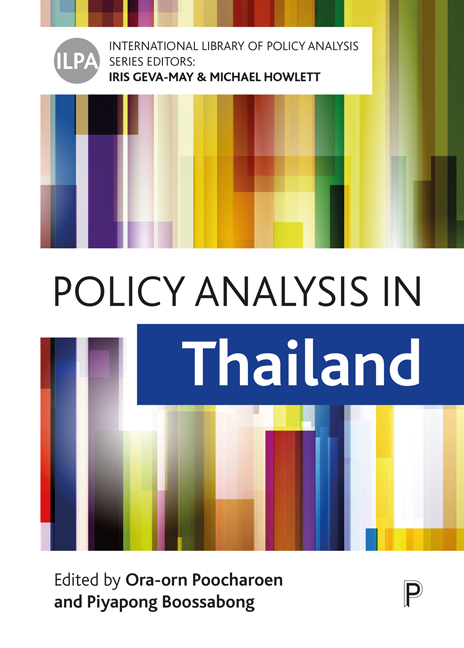Book contents
- Frontmatter
- Contents
- List of figures and tables
- List of abbreviations
- Notes on contributors
- Editors’ introduction to the series
- Introduction
- Part One History, styles and methods of policy analysis in Thailand
- Part Two Policy analysis within executive government
- Part Three Policy analysis beyond executive government
- Part Four Political parties and interest groups in policy analysis
- Part Five Policy analysis education and research
- Index
eight - Parliamentary committees, legislative supporting agencies and policy advice
Published online by Cambridge University Press: 20 January 2024
- Frontmatter
- Contents
- List of figures and tables
- List of abbreviations
- Notes on contributors
- Editors’ introduction to the series
- Introduction
- Part One History, styles and methods of policy analysis in Thailand
- Part Two Policy analysis within executive government
- Part Three Policy analysis beyond executive government
- Part Four Political parties and interest groups in policy analysis
- Part Five Policy analysis education and research
- Index
Summary
Introduction
The Thai parliament is notorious for its contentious power struggle and lowquality debates. The role of policy analysis in parliamentary work is questionable. Based on a series of interviews with senators, members of the House of Representatives and parliamentary administrators, the central argument of this chapter is that Thai parliamentarians have attempted to incorporate policy analysis tools into their legislative tasks. However, their attempt is hampered by the fusion-of-power parliamentary system and the current constitution that is premised against elected officials. Furthermore, the research and administrative services provided by the parliamentary administration are limited, worsening the information asymmetry between the executive and legislative branches.
Political journalists in Thailand enjoy an annual tradition of giving satirical names to politicians occupying top leadership positions in government.1 In 2021, ‘parasites’ and ‘termites’ were chosen to mock the two chambers of the national legislative branch. Members of the House of Representatives or members of parliament (MPs) were dubbed ‘termites in a rut’ as they always appeared to keep themselves busy with their political survival and power struggle at the expense of the public interest. Parliamentary debates and committee meetings were frequently disrupted by a lack of quorum (Bangkok Post, 2019). On the other hand, the senators appointed by the former National Council for Peace and Order (NCPO)2 were described as ‘parasites’ due to their connection to the senior junta figures and their insidious manoeuvring of the legislative process to ensure
continuity of the NCPO's work (Bangkok Post, 2019). The two monikers suggest that both the upper and lower houses of the Thai parliament did not take their duties seriously. Policy analysis in the Thai parliament seems out of the question. Contrary to the political satire, this chapter argues that Thai senators and MPs have attempted to incorporate policy analysis tools into their work. However, the legislators’ use of evidence in legislative agenda setting may appear uncommon or even unlikely in the public eye for two reasons.
- Type
- Chapter
- Information
- Policy Analysis in Thailand , pp. 155 - 169Publisher: Bristol University PressPrint publication year: 2023



